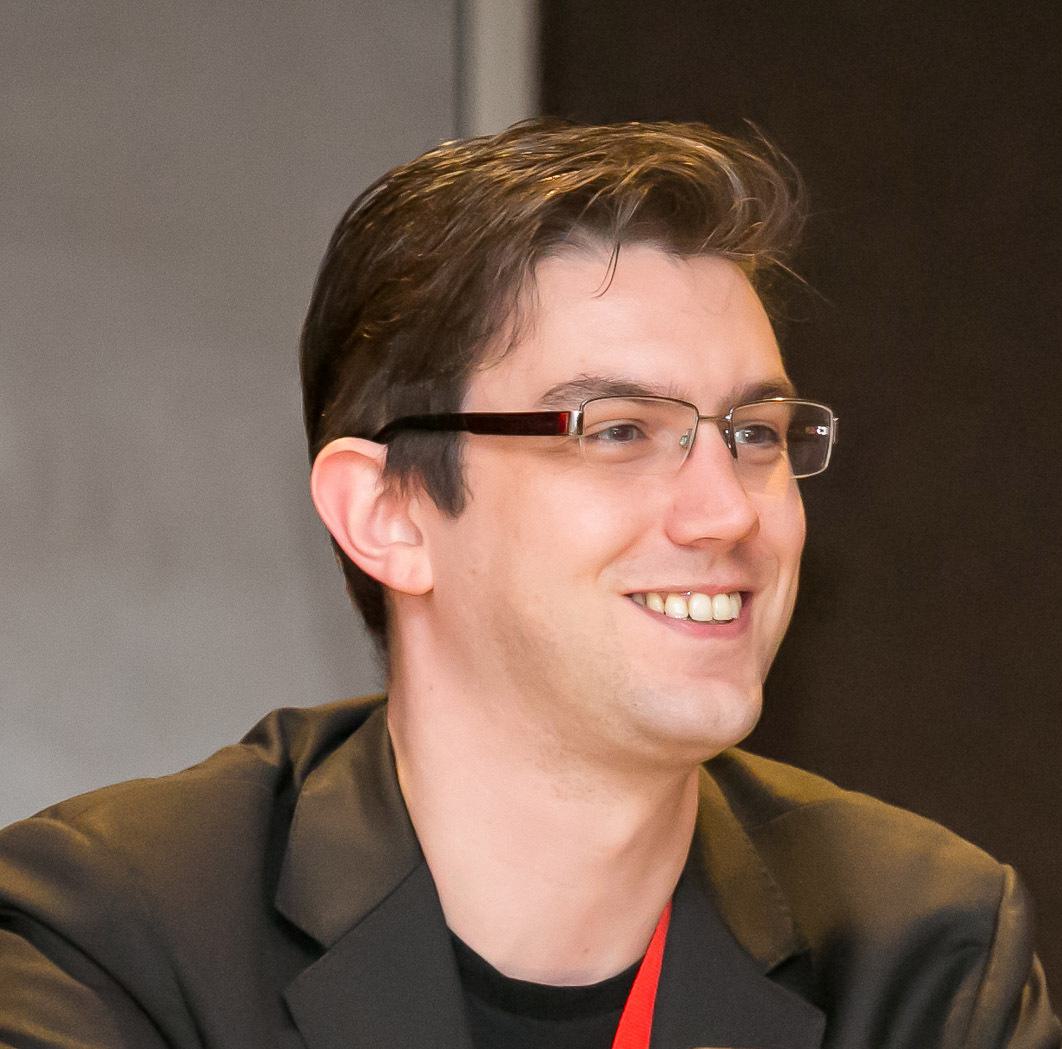Two days in Dublin: fundraising inspiration in Ireland’s capital – part four
SOFII’s four-part feature recording edited highlights from one of 2016’s best world-class fundraising conferences. In the final edition of SOFII’s report on the Ask Direct Summer School, we get a sneak preview of an upcoming new series on SOFII from Alan Clayton and an account of Ken Burnett’s closing plenary.
- Written by
- Joe Burnett
- Added
- November 24, 2016
Alan Clayton
The essential roles of the CEO and board in fundraising growth
Scotsman Alan Clayton is one of fundraising’s most recognised and respected experts, but I’m not going to give you a detailed account of his talk in Dublin. Before you get too disappointed, however, it’s because Alan will be writing a series of articles for SOFII covering the points he raised in his Dublin talk. At the Ask Direct summer school, he discussed leadership thinking, the balance between the money and the mission for organisations and how to set targets, build projects and lead a great fundraising campaign. Of course, he gave some excellent examples in the process.
If that has whetted your appetite to learn more, please keep an eye out for Alan’s upcoming series on fundraising inspiration!
Ken Burnett
A fundraising revolution is about to take place – you can be a part of it
SOFII’s founder Ken Burnett conducted the closing plenary of the Ask Direct summer school and brought the two days full circle by picking up on a number of the points raised by Mark Phillips in his opening session.
Ken took attendees back in time to his first experience of fundraising, when he was just six or seven years old and his mother was volunteer area secretary for Dr Barnardo’s Homes. Her role was to gather everyone in her area who had a Dr Barnardo’s collecting box into her home to count out the money they had raised. Whilst Ken was counting out the money on the living room table, his mum would offer everyone who had brought in a box some of her renowned home-made fudge. This unique act of relationship fundraising was so successful that people would queue to get into the home, meaning Ken had a bigger job on his hands in counting it out. Rewarded with fudge himself, he soon put on a bit of weight but above all learned that reciprocity is essential when dealing with donors: you need to give in order to get.

Sadly, this is a lesson too few organisations have kept in mind. Ken described getting bombarded by the United States Democratic Party leadership requesting donations to help them win back the House of Representatives, with nine in a single day in September alone. Nancy Pelosi, Joe Biden, Barack Obama, Barbra Streisand and Carole King: all got in touch (one presumes via a put-upon set of interns and volunteers) to ask for money in increasingly apocalyptic tones. As Ken says, ‘Surely when it comes to asking properly we fundraisers aren’t as bad as the Democratic Party?’ Events of the last year or so tell us otherwise.
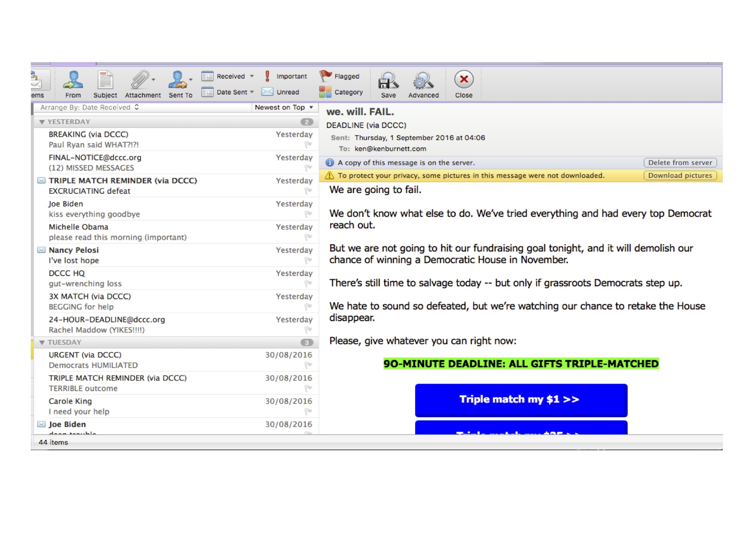
Ken played a BBC Radio 4’s Today programme talk from the Revered Roy Jenkins on the ‘Thought for the Day’ slot, from November 30th, 2015. Reverend Jenkins mused on the death of Olive Cooke and how it led him and friends to discuss during a dinner party being bothered by fundraisers themselves. They all had negative stories to tell. ‘[Olive Cooke’s] story lit a fuse’ said the Reverend. ‘I do hope someone’s working on it, for all our sakes.’
If fundraising is a difficult and at times a lonely job, we can make this much clearer by consistently doing things differently, Ken says. To start with, we need to identify the enemy that has led us to the difficult position we are in. The enemy is not who we think it is. It’s not the Daily Mail, Sir Stuart Etherington (the man chosen by the UK government to investigate fundraising practices in the wake of last year’s scandal), it’s not your organisation’s board of trustees or its executive team. The enemy is not your donors either. Ken warned the world of who the enemy was 25 years ago in his groundbreaking book Relationshop Fundraising:
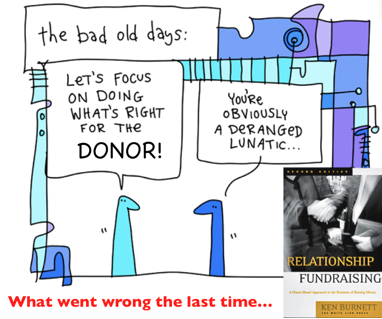
Hint: it’s the blue chap on the right, and this cartoon describes the stark truth of who the enemy is:
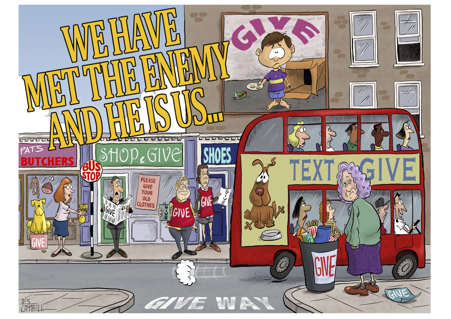
Ken provides a list:
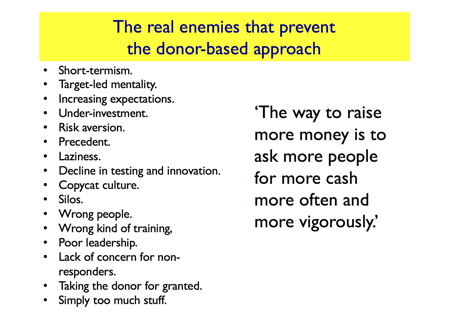
By focusing on these bad approaches, we risk losing awareness of what actually matters to donors – and therefore by implication, to us.
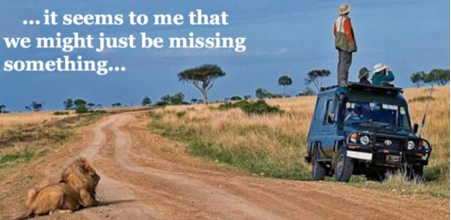
There are still reasons to be cheerful, however, and more and more people are seeing the writing on the wall, even if they can’t quite read it yet.
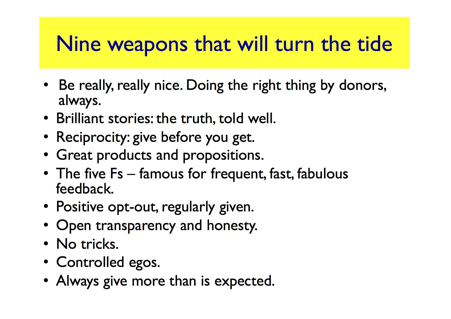
We need to think better about the options we provide donors with, such as opt-outs and other helpful choices that put the donor in control, as UK cancer charity for children CLIC Sargent have done.
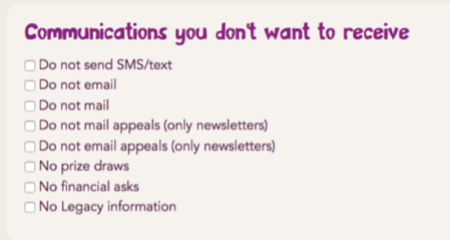
Cancer Research UK, meanwhile, has admitted that their plan to only contact donors who have opted in to communications will mean it could lose tens of millions of pounds, but they claim, it’s still the right thing to do. They will start this process in April 2017.
There is another, perfereable route to opting in, says Ken – see Continuous Donor Choice from Botton Village, below.
What Ken advocates is nothing less than a culture change:
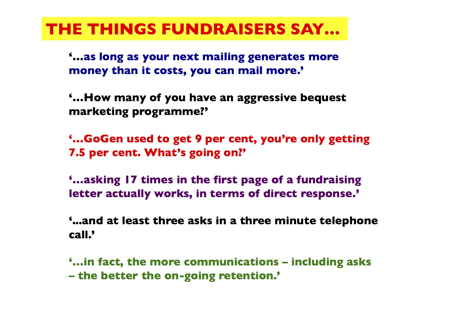
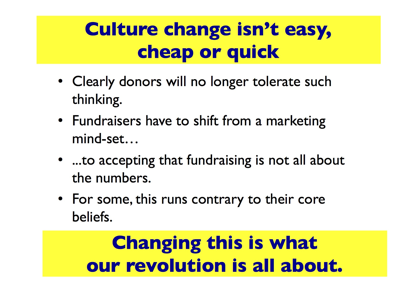
To take this bold step forwards, Ken co-founded the Commission on the Donor Experience (CDE), and states that ‘fundraising growth is not the objective, but with happier donors, it will be the outcome’.
He and the commission have embarked on 25 transformational projects:
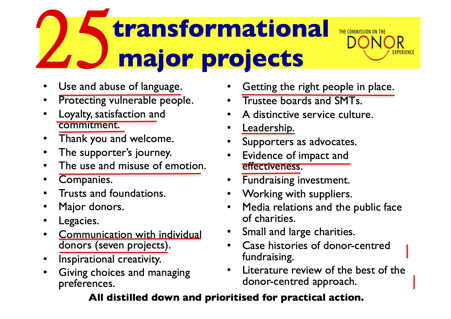
More than 30 years ago, a small charity in North Yorkshire called Botton Village showed the way by introducing a system now known as Continuous Donor Choice. See here. Botton Village is a working rural community where adults with a mental handicap can lead happy, productive lives living alongside ‘co-workers’ who don't have a mental handicap. In the late eighties, they started producing the reply form below, offering donors the opportunity to determine for themselves what they wanted to receive from Botton Village’s fundraisers rather than, what was up until then the universal norm, that fundraisers decided what donors should receive and just sent what they wanted their donors to have.
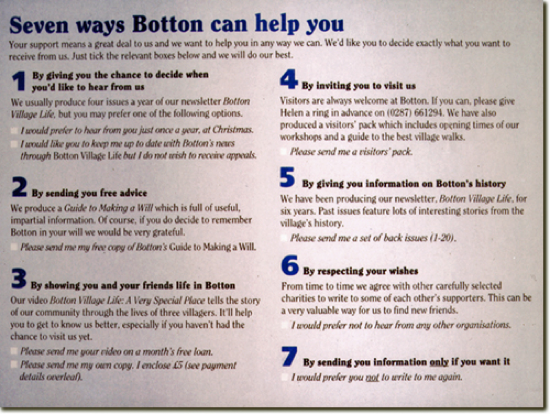
You can read more about this remarkable decision here, and their 30 years of fundraising results to die for:
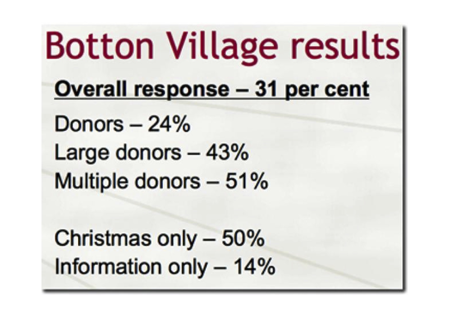
The results figures above come from the main pre-Christmas (October) appeal and are a five-year average from just five of the main donor segments that Botton Village mails. In this period the controversial ‘Christmas only’ segment never performed at less than 50 per cent response and the ‘information only’ segment – where supporters are not asked for money nor are they even sent a reply form and reply envelope – consistently performed at a level higher than many charities will achieve from their ‘warm’ file.
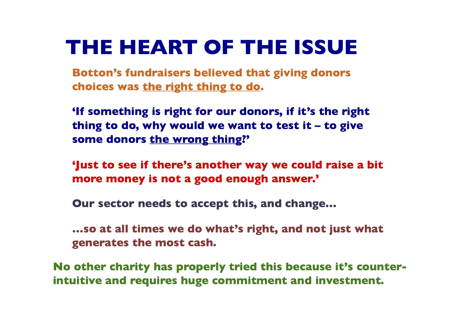
The above quote from Ken explains why following Botton Village’s lead is so crucial, but also why it can be a challenge. But, like he says, to do otherwise is having a damaging effect and research backs this up:
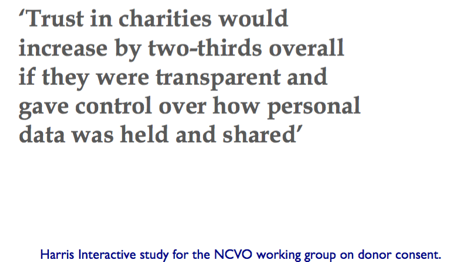
The Commission on the Donor Experience is still in its early stages, but Ken gives us a guess at some outcomes from the 25 main project areas:
- What we measure will change.
- But first, how we think about what we measure must also change.
Fundraising in Britain should be donor-led and not target-led and you don’t always have to ask for money in every communication.
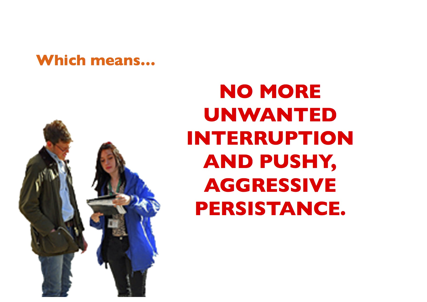
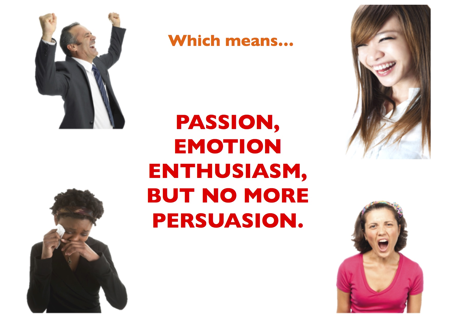
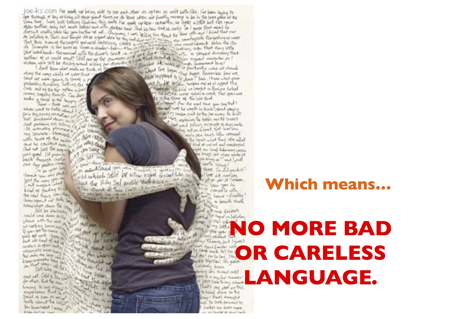
It also means no more putting donations ahead of donors; no more donors giving in spite of fundraisers rather than because of them; no more charity creative that makes non-donors feel bad rather than donors feel good. And it means achieving the five Fs:
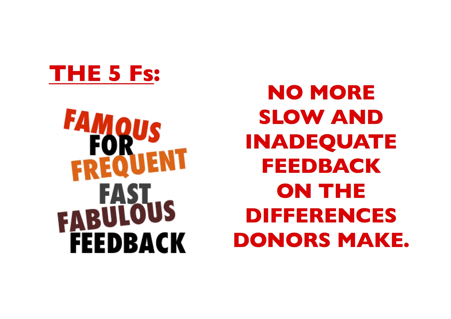
Such a culture change also means no more neglecting our homework and hunting in the dark, no more passionless professionals, no more inadequate leaders and unengaged boards, no more blaming others for our lack of oversight and no more tolerating self-serving arrogance and board neglect.
Fundraising depends on public goodwill. If BMW claim to aim for the ultimate driving experience, we should be aiming for the ultimate donor experience. If no one demands more of a BMW than BMW, no one should demand more of fundraising than each and every fundraiser.
Ken Burnett’s blunt appraisal of where the sector is going wrong and optimistic explanation of what it needs to get right to regain the public trust was a fitting final rallying cry to end two days of insight, passion and honest debate in Ireland’s fair capital. SOFII would like to thank Damian O’Broin and his excellent team at Ask Direct for their hospitality and the high quality of this wonderful event. If you couldn’t make it to Dublin, we hope these four missives have given you some great ideas to work with and take further.




